人教版八年级上册英语知识点汇总资料
人教版八年级上册英语语法、短语和知识点总结归纳

人教版八年级上册英语语法、短语和知识点总结归纳一、语法1. 一般现在时- 用法:表示经常性或惯性的动作或状态。
- 结构:主语 + 动词原形 (+ 其他成分)- 示例:I play soccer every weekend.2. 一般过去时- 用法:表示过去某个时间点或一段时间内发生的动作或存在的状态。
- 结构:主语 + 动词过去式 (+ 其他成分)- 示例:She watched a movie last night.3. 现在进行时- 用法:表示现在正在发生的动作。
- 结构:主语 + am/is/are + 动词-ing (+ 其他成分)- 示例:They are studying for the exam.4. 现在完成时- 用法:表示动作或状态发生在过去某个时间点,但与现在有关。
- 结构:主语 + have/has + 动词过去分词 (+ 其他成分)- 示例:I have finished my homework.5. 情态动词- 用法:表示能力、意愿、可能性等。
- 常见的情态动词有 can, could, may, might, must, should, ought to 等。
- 示例:He should go to bed early.二、短语1. as well as- 用法:表示两个事物同时存在或发生。
- 示例:She can speak English as well as Chinese.2. in order to- 用法:为了做某事。
- 示例:They woke up early in order to catch the train.3. by the way- 用法:用于引入一个新的话题或问题。
- 示例:By the way, have you seen the latest movie?三、知识点1. 直接引语和间接引语- 直接引语:用引号括起来的原话。
- 间接引语:将直接引语转述为陈述句或疑问句。
人教版八年级英语上册知识点总结

人教版八年级英语上册知识点总结一、基本语法1.时态:英语时态分为以下几种:现在时、过去时、将来时。
每种时态又分为简单时态、进行时态、完成时态和完成进行时态等。
例如:–现在时:简单现在时: 主语 + 动词原形;进行现在时:主语 + be(am/is/are) + v-ing;完成现在时:主语 + have / has + 过去分词;完成进行现在时:主语 + have / has + been + v-ing。
–过去时:简单过去时:主语 + 动词过去式;进行过去时:主语 + was / were + v-ing;完成过去时:主语 + had + 过去分词;完成进行过去时:主语 + had + been + v-ing。
–将来时:简单将来时:主语 + will / shall + 动词原形;进行将来时:主语 + will / shall + be + v-ing;完成将来时:主语 + will / shall + have + 过去分词;完成进行将来时:主语 + will / shall + have + been + v-ing。
2.倒装句:倒装是指把谓语动词放在主语前面形成的一种语法现象。
如:Only in this way can we solve the problem. (只有这样才能解决问题。
) 倒装句句型格式为:_____+主语(名词或代词)+_____。
在不同的情况下需要用到不同的“辅助动词/助动词”来进行倒装。
3.被动语态:被动语态就是在句子中表达动作的承受者(即主语)的语态。
结构为:被(或受)动责任的动词(to be) + 过去分词。
如:The book was written by him.(这本书是由他写的。
)4.虚拟语气:虚拟语气是指在表示假设,愿望,建议等语气时所使用的一种语态形式。
其结构为:主语+should/could/might/would+(have)+动词原形。
如: If I were you, I would buy this dress(如果我是你,我会买这件衣服。
人教版八年级英语上册知识点总结和复习要点
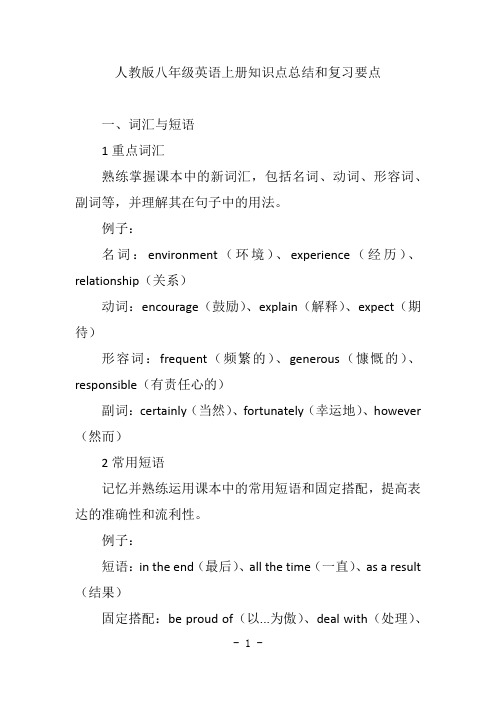
人教版八年级英语上册知识点总结和复习要点一、词汇与短语1重点词汇熟练掌握课本中的新词汇,包括名词、动词、形容词、副词等,并理解其在句子中的用法。
例子:名词:environment(环境)、experience(经历)、relationship(关系)动词:encourage(鼓励)、explain(解释)、expect(期待)形容词:frequent(频繁的)、generous(慷慨的)、responsible(有责任心的)副词:certainly(当然)、fortunately(幸运地)、however (然而)2常用短语记忆并熟练运用课本中的常用短语和固定搭配,提高表达的准确性和流利性。
例子:短语:in the end(最后)、all the time(一直)、as a result (结果)固定搭配:be proud of(以...为傲)、deal with(处理)、pay attention to(注意)二、句型与语法1基本句型熟练掌握五种基本句型,包括主语+谓语、主语+谓语+宾语、主语+谓语+间接宾语+直接宾语、主语+谓语+宾语+宾语补足语、主语+系动词+表语。
例子:主语+谓语:She sings.(她唱歌。
)主语+谓语+宾语:I like apples.(我喜欢苹果。
)主语+谓语+间接宾语+直接宾语:He gave me a book.(他给了我一本书。
)主语+谓语+宾语+宾语补足语:I found the book interesting.(我发现这本书很有趣。
)主语+系动词+表语:She is beautiful.(她很漂亮。
)2时态深入学习并掌握现在完成时、过去进行时、一般将来时、过去将来时等时态的用法和形式。
例子:现在完成时:I have already seen that movie.(我已经看过那部电影了。
)过去进行时:They were playing football when I called them.(我打电话给他们时,他们正在踢足球。
初二英语上册知识点总结(人教版)

初二英语上册知识点总结(人教版)1. 语法知识点- 一般现在时:表示经常性或惯性的动作、状态或客观真理。
- 一般过去时:表示过去发生的动作或存在的状态。
- 现在进行时:表示现在正在进行的动作。
- 一般将来时:表示将来将要发生的动作或存在的状态。
- 定语从句:用来修饰名词或代词的从句。
- 状语从句:用来表示时间、地点、原因、条件或目的等的从句。
- 直接引语和间接引语的转换:将直接引语转化成间接引语需要考虑时态、人称、时间、地点等问题。
2. 词汇与短语- 常用动词短语:例如,look forward to, take part in, give up等。
- 时间短语:例如,in the morning, at night, on weekends等。
- 形容词与副词:例如,beautiful, quickly, slowly等。
- 连词与介词:例如,but, and, in, on等。
3. 句型结构- 主语 + 谓语:例如,Tom studies English.- 主语 + 不及物动词 + 状语:例如,He runs quickly.- 主语 + 系动词 + 表语:例如,She is beautiful.- 主语 + 及物动词 + 宾语:例如,I eat an apple.4. 阅读技巧- 理解词义:通过上下文判断单词的意思。
- 掌握关键信息:抓住文章中的重要信息。
- 推测逻辑关系:通过逻辑推理理解段落和篇章的结构。
- 注意细节问题:注意文章中的细节信息。
5. 听力技巧- 提前预测:在听对话或短文之前,先预测可能会涉及的内容。
- 注意语境:在听时将听到的语句与前后语境联系起来理解。
- 注意听力焦点:抓住关键词汇、数字和特别强调的内容。
以上是初二英语上册知识点的简单总结,希望对你有帮助!。
新人教版初中英语八年级上册知识总结(最全)
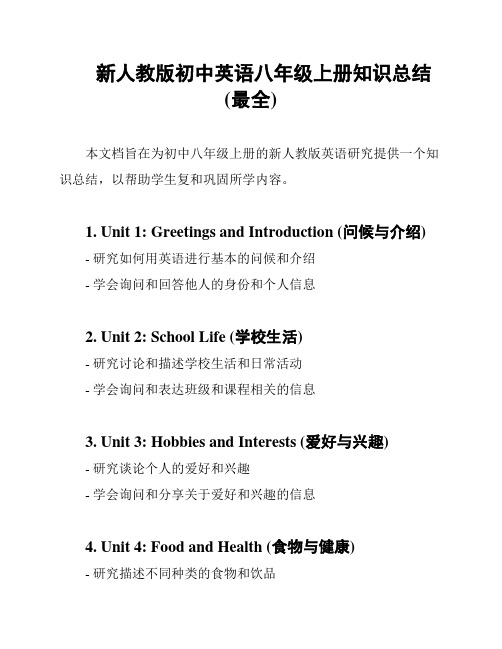
新人教版初中英语八年级上册知识总结(最全)本文档旨在为初中八年级上册的新人教版英语研究提供一个知识总结,以帮助学生复和巩固所学内容。
1. Unit 1: Greetings and Introduction (问候与介绍)- 研究如何用英语进行基本的问候和介绍- 学会询问和回答他人的身份和个人信息2. Unit 2: School Life (学校生活)- 研究讨论和描述学校生活和日常活动- 学会询问和表达班级和课程相关的信息3. Unit 3: Hobbies and Interests (爱好与兴趣)- 研究谈论个人的爱好和兴趣- 学会询问和分享关于爱好和兴趣的信息4. Unit 4: Food and Health (食物与健康)- 研究描述不同种类的食物和饮品- 学会提醒他人注意饮食健康和生活惯5. Unit 5: Festivals and Celebrations (节日与庆祝) - 研究讨论和描述各种节日和庆祝活动- 学会询问和分享关于节日和庆祝的信息6. Unit 6: Travel and Transportation (旅行与交通) - 研究谈论旅行和交通方式- 学会询问和表达关于旅行和交通的信息7. Unit 7: Daily Routines (日常作息)- 研究讨论和描述日常作息和活动安排- 学会询问和分享关于日常作息的信息8. Unit 8: Environmental Protection (环境保护)- 研究讨论和描述环境保护的重要性和方法- 学会提醒他人关于环境保护的意识和行动本文档总结了新人教版初中英语八年级上册所有单元的核心内容。
希望这个总结能帮助同学们回顾和巩固所学的知识,以便更好地应对考试和实际应用。
人教版八年级英语上册知识点总结

人教版八年级英语上册知识点总结人教版八年级英语上册知识点句子成分和类型1.主语:句子所陈述的对象。
2.谓语:主语发出的动作。
一般是有动作意义的动词。
3.宾语:分为动词宾语和介词宾语,属于动作的承受者。
4.系动词:表示状态或状态变化的动词,没有实际的动作意义。
如 be,感官系动词(look, sound, smell, taste 和 feel)、保持类系动词(keep,stay 和 remain)、状态变化类系动词(become、get、turn 和 go)等。
5.表语:紧跟系动词后面的成分。
6.定语:修饰名词或代词的成分。
7.状语:修饰形容词、副词、动词或句子的成分。
8.补语:分为宾语补足语和主语补足语。
是对宾语和主语的补充说明,与其有主动或被动的逻辑关系。
例如:You should keep the room clean and tidy.你应该让屋子保持干净整洁。
(You是主语, should keep是谓语,the room是宾语,clean and tidy是宾语补足语。
)This kind of food tastes delicious.这种食物吃起来很可口。
(This kind of food是主语, tastes是系动词, delicious是表语。
)注意:主语、谓语、宾语、系动词、表语、补语是一个句子的主干成分;定语和状语是一个句子的修饰性成分,不是主干成分。
9.简单句的基本形式是由一个主语加一个谓语构成。
10.复合句由一个主句和一个或一个以上的从句构成。
11.两个或两个以上的简单句用并列连词连在一起构成的句子,叫做并列句,其基本结构是“简单句+并列连词+简单句”。
一般疑问句一、不用疑问词,但需要用yes或no回答的疑问句,叫一般疑问句。
句末用问号“?”。
一般疑问句的基本用法及结构一般疑问句用于对某一情况提出疑问,通常可用yes和no来回答,读时用升调。
其基本结构是“be / have / 助动词+主语+谓语(表语)”:Is he interested in going? 他有兴趣去吗?Have you ever been to Japan? 你到过日本吗?Does she often have colds? 她常常感冒吗?Did you ask her which to buy? 你问没问她该买哪一个?二、陈述句变一般疑问句的方法1.动词be的疑问式:动词be根据不同的时态和人称可以有am, is, are,was, were等不同形式,可用作连系动词(表示“是”、“在”等)和助动词(用于构成进行时态和被动语态等),但不管何种情况,构成疑问式时,一律将动词be的适当形式置于句首:句型:Be动词+主语~?Is your father angry?你父亲生气了吗?Yes,he is.是的,他生气了。
人教版八上英语知识点

人教版八上英语知识点人教版八年级上册英语知识点概述一、词汇与短语1. 基础词汇- 家庭成员:mother, father, sister, brother, grandfather, grandmother, etc.- 学校科目:math, English, Chinese, physics, history, etc. - 日常活动:get up, go to school, havebreakfast/lunch/dinner, do homework, etc.- 常见食物:apple, banana, chicken, rice, noodles, etc.- 动物与宠物:dog, cat, fish, bird, etc.2. 短语- 问路:Excuse me, where is the...?- 购物:Can I help you? How much is it?- 餐馆用语:A table for two, please. I'd like some...- 学校用语:Let's begin. Take notes. Pay attention, please.二、语法点1. 一般现在时- 表示经常性或习惯性的动作。
- 动词第三人称单数的变化规则。
2. 一般过去时- 表示过去某一确定时间发生的动作或状态。
- 规则动词和不规则动词的过去式。
3. 现在进行时- 表示正在进行的动作。
- 构成:am/is/are + V-ing。
4. 可数名词与不可数名词- 可数名词的单复数形式。
- 不可数名词的量化表达。
5. 代词- 主格和宾格代词。
- 形容词性物主代词和名词性物主代词。
6. 简单句与并列句- 简单句的基本结构。
- 并列句的连接词:and, but, or, so 等。
三、阅读理解1. 阅读技巧- 快速浏览(Skimming)和详细阅读(Scanning)。
- 根据上下文推断生词的意思。
人教版八年级英语上册知识点总结(全)
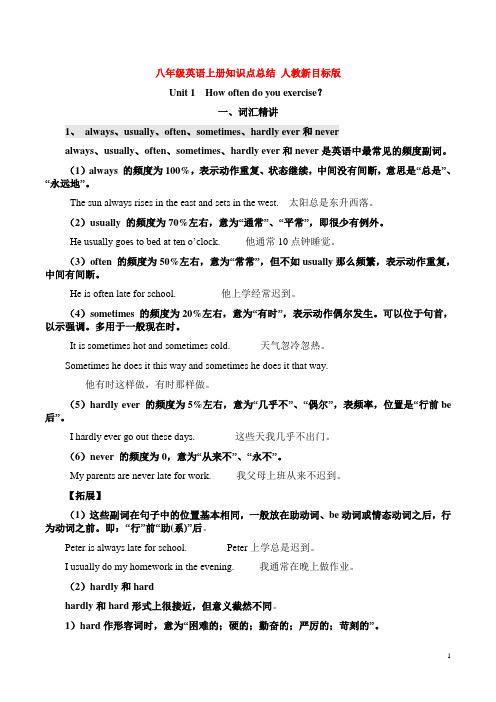
八年级英语上册知识点总结人教新目标版Unit 1 How often do you exercise?一、词汇精讲1、always、usually、often、sometimes、hardly ever和neveralways、usually、often、sometimes、hardly ever和never是英语中最常见的频度副词。
(1)always 的频度为100%,表示动作重复、状态继续,中间没有间断,意思是“总是”、“永远地”。
The sun always rises in the east and sets in the west. 太阳总是东升西落。
(2)usually 的频度为70%左右,意为“通常”、“平常”,即很少有例外。
He usually goes to bed at ten o’clock. 他通常10点钟睡觉。
(3)often 的频度为50%左右,意为“常常”,但不如usually那么频繁,表示动作重复,中间有间断。
He is often late for school. 他上学经常迟到。
(4)sometimes 的频度为20%左右,意为“有时”,表示动作偶尔发生。
可以位于句首,以示强调。
多用于一般现在时。
It is sometimes hot and sometimes cold. 天气忽冷忽热。
Sometimes he does it this way and sometimes he does it that way.他有时这样做,有时那样做。
(5)hardly ever 的频度为5%左右,意为“几乎不”、“偶尔”,表频率,位置是“行前be 后”。
I hardly ever go out these days. 这些天我几乎不出门。
(6)never 的频度为0,意为“从来不”、“永不”。
My parents are never late for work. 我父母上班从来不迟到。
(完整版)人教版八年级上册英语知识点汇总
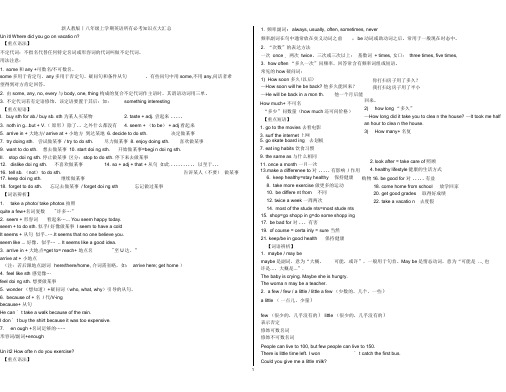
新人教版丨八年级上学期英语所有必考知识点大汇总Un itl Where did you go on vacatio n? 【重点语法】不定代词:不指名代替任何特定名词或形容词的代词叫做不定代词。
用法注意:1. some和any +可数名/不可数名。
some多用于肯定句,any多用于否定句、疑问句和条件从句。
有些问句中用some,不用any,问话者希望得到对方肯定回答。
2. 由some, any, no, every 与body, one, thing 构成的复合不定代词作主语时,其谓语动词用三单。
3. 不定代词若有定语修饰,该定语要置于其后:如:something interesting 【重点短语】I. buy sth for ab./ buy sb. sth 为某人买某物 2. taste + adj. 尝起来 .....3. noth in g...but + V.(原形)除了.. 之外什么都没有4. seem + (to be) + adj 看起来5. arrive in + 大地方/ arrive at + 小地方到达某地6. decide to do sth. 决定做某事7. try doing sth. 尝试做某事/ try to do sth. 尽力做某事8. enjoy doing sth. 喜欢做某事9. want to do sth. 想去做某事10. start doi ng sth. 开始做某事=begi n doi ng sth. II. stop doi ng sth. 停止做某事区分:stop to do sth. 停下来去做某事12. dislike doi ng sth. 不喜欢做某事14. so + adj + that + 从句如此.......... 以至于...16. tell sb. (not) to do sth. 告诉某人(不要)做某事17. keep doi ng sth. 继续做某事18. forget to do sth. 忘记去做某事/ forget doi ng sth 忘记做过某事【词语辨析】1. take a photo/ take photos 拍照quite a few+名词复数"许多…”2. seem + 形容词看起来…... You seem happy today. seem + to do sth. 似乎/ 好像做某事I seem to have a cold It seems + 从句似乎..….It seems that no one believe you. seem like ... 好像,似乎… .. It seems like a good idea.3. arrive in + 大地点=get to= reach+ 地点名"至U达. ”arrive at + 小地点(注:若后跟地点副词here/there/home, 介词需省略,如:arrive here; get home )4. feel like sth 感觉像…feel doi ng sth. 想要做某事5. wonder (想知道)+疑问词(who, what, why)引导的从句。
人教版八年级上册英语知识点汇总

人教版八年级上册英语知识点汇总234钱”。
人(sb.) spend 时间/钱(in) doing“花费多少时间来做某事”。
pay 的主语必须是人,而“花钱买某物”为pay...for...10. however 副词,意为“然而,可是”,表示转折关系,可放在句首、句中、句末。
Unit3 I’m more outgoing than my sister.重点语法】1. 形容词和副词的比较等级(1)形容词和副词的原形就是原级(2)比较级,表示较……或更……(3)最高级,表示最...。
2. 比较级句型:(1)A + be动词+形容词的比较级+than +B “A比B更……”(注意:A与B必须是同级的,即必须是人与人,物与物进行对比)(2)“A+实意动词+副词比较级+ than + B”表示“A 比B…”(3)比较A ,B两人/两事物问其中哪一个较…...时用句型:“Who/which +谓语动词+ adj./adv.比较级,A or B ?”Who is thinner, Jenny or Mary?3. 比较级的特殊用法(1)“比较级+and+比较级”,意为“越来越”。
多音节比较级用“more and more+原级”(2)“the+比较级(…), the+比较级(…)”意思是:”越…越…”The more, the better.(3)主+ is + the 形容词比较级+of the two+名复“主语是两者中较......的”4. 两者在某一方面相同:A+谓语动词/be动词+as+ adj./adv.原级+ as+ B.Helen is as tall as Amy.Peter studies as hard as Tom.表示两者在某一方面不及另一方时,用“not as/so+形容词或副词原级+as”I am not as tall as my sister.5. 形容词,副词比较级前的修饰语。
人教版八年级英语上册知识点总结完整版

U n i t1W h e r e d i d y o u g o o n v a c a t i o n go on vacation 去度假stay at home 待在家里go to the mountains 去爬山go to the beach 去海滩visit museums 参观博物馆go to summer camp 去参观夏令营quite a few 相当多study for 为……而学习go out 出去most of the time 大部分时间taste good 尝起来很好吃have a good time 玩得高兴of course 当然feel like 给……的感觉;感受到go shopping 去购物in the past 在过去walk around 四处走走because of 因为one bowl of…一碗……the next day 第二天drink tea 喝茶find out 找出;查明go on 继续take photos 照相something important 重要的事up and down 上上下下come up 出来buy sth. for sb. / buy sb. sth.为某人买某物taste + adj. 尝起来……look+adj. 看起来……nothing…but+动词原形除了……之外什么都没有seem+to be+ adj. 看起来……arrive in+大地点 / arrive at+小地点到达某地decide to do sth.决定去做某事try doing sth.尝试做某事 / try to do sth.尽力去做某事forget doing sth.忘记做过某事/ forget to do sth.忘记做某事enjoy doing sth.喜欢做某事want to do sth.想去做某事start doing sth.开始做某事stop doing sth. 停止做某事dislike doing sth. 不喜欢做某事keep doing sth.继续做某事Why not do. sth.为什么不做……呢so+adj.+that+从句如此……以至于……tell sb. not to do sth. 告诉某人不要做某事Unit2 How often do you exercisehelp with housework 帮助做家务 on weekends 在周末how often 多久一次 hardly ever 几乎从不once a week 每周一次 twice a month 每月两次every day 每天 be free 有空go to the movies 去看电影 use the Internet 用互联网swing dance 摇摆舞 play tennis 打网球stay up late 熬夜;睡得很晚 at least 至少have dance and piano lessons 上舞蹈课和钢琴课 the best way to do sth.做某事的最好方式go to bed early 早点睡觉 play sports 进行体育活动be good for 对……有好处 go camping 去野营not…at all 一点儿也不…… in one’s free time 在某人的业余时间the most popular 最受欢迎的 such as 比如;诸如old habits die hard 积习难改 go to the dentist 去看牙医morn than 多于;超过 less than 少于help sb. with sth.帮助某人做某事 . How about… ...... 怎么样/ ……好不好want sb. to do sth.想让某人做某事 How many+可数名词复数+一般疑问句……有多少……主语+find+that 从句. ……发现…… spend time with sb.和某人一起度过时光It’s+ adj.+ to do sth. 做某事的……的. ask sb. about sth.向某人询问某事by doing sth. 通过做某事 What’s your favorite……你最喜爱的……是什么Unit3 I’m more outgoing than my sister.more outgoing 更外向 care about 关心;介意as long as 只要;既然 reach for 伸手取touch one’s heart 感动某人 be good at 擅长……want to do sth.想要做某事 It’s+ adj.+for sb. to do sth. as…as…与……一样……be like a mirror 像一面镜子 bring out 使显现;使表现出in fact 事实上;实际上 be good with 善于与……相处be good at doing sth 擅长做某事 make sb. do sth.让某人做某事as+adj./adv.的原级+as 与……一样……对某人来说,做某事……的.be talented in music 有音乐天赋 the singing competition 唱歌比赛be different from 与……不同 the most important 最重要的get better grades 取得更好的成绩 make friends 交朋友the other 其他的 be similar to 与……相像的/类似的the same as 和……相同;与……一致 have fun doing sth.享受做某事的乐趣形容词和副词的比较级、最高级大多数形容词和副词有三个等级:1)原级不作比较,修饰词 very,so,too,pretty,really;2)比较级, 表示“较……”或“更……”的意思两者之间进行比较标志词 than,A or B,of the two, 修饰词 much,a , lot,a little;3最高级,表示“最……”的意思三者或三者以上作比较,形容词最高级前面一般要加定冠词 the,后面可带 inof短语来什么比较的范围. 形容词和副词的比较级和最高级规则变化:构成方法原级比较级最高级单音节词和部分双音节词一般在词尾加-er 或 -est high short higher shorter later finest hotter bigger thinner fatter funnier easier earlier more beautiful more athletic more outgoing highest shortest latest finest hottest biggest thinnest fattestfunniest easiest earliest most beautiful most athletic most outgoing以字母 e 词尾的词,加-r 或-st:late fine重读闭音节词词尾只有一个辅音字母时,先双写辅音字母,再加-er 或-est:hot big thin fat以“辅音字母+y”结尾的双音节词,先把“y”改为“i”,再加 -er 或-est:funny easy early多音节词和部分双音节词,在词前加 more 或 most:eautifulathletic outgoing形容词和副词的比较级和最高级不规则变化:原级 good/well bad/badly many/much little far比较级 better worse more less farther更远 further 更深远最高级 best worst most least farthest最远 furthest 最深远as…原级as 与……一样…… Liming is as tall as Jim.Jack runs as fast as Tom.not as/so…as 不如 Lily is not as/so tall as Lucy. =Lily is shorter thanUnit 4 What’s the best movie theatermovie theater 电影院 close to…离……近clothes store 服装店 in town 在镇上so far 到目前为止 10 minutes by bus 坐公共汽车 10 分钟的路程talent show 才艺表演 in common 共同;共有around the world 世界各地;全世界 more and more……越来越……and so on 等等 all kinds of……各种各样的be upto 是……的职责;由……决定 not everybody 并不是每个人make up 编造故事、谎言等 play a role in…在……方面发挥作用/ 有影响for example 例如 take…seriously 认真对待give sb. sth.给某人某物 come true梦想、希望实现;达到Can I ask you some…我能问你一些……吗 How do you like…你认为……怎么样Thanks for doing sth.因做某事而感谢. What do you think of…你认为……怎么样much+ adj./adv.的比较级……得多 watch sb. do sth.观看某人做某事play a role in doing sth.发挥做某事是作用/在做某事方面扮演重要的角色one of+可数名词的复数……之一Unit8How do you make a banana milk shakemilk shake 奶昔 turn on 接通电流、煤气、水等;打开pour…into…把……倒入…… a cup of yogurt 一杯酸奶a good idea 好主意 on Saturday 在星期六cut up 切碎 put…into…把……放入……one more thing 还有一件事 a piece of 一片/张/段/首……at this time 在这时 a few 一些;几个fill… with…用……把……装满 cover…with…用……覆盖……one by one 一个接一个;逐个;依次 a long time 很长时间how many+可数名词复数多少…… how much+不可数名词多少……It’s time for sb.+to do sth. 到某人做某事的时间了First…Next…Then…Finally 首先……接下来……然后…….最后……want + to do sth.想要做某事 forget+to do sth.忘记去做某事how + to do sth.如何做某事 need+to do sth.需要做某事make+宾语+形容词使……怎样 let sb. +do sth.让某人做某事Unit9 Can you come to my partyon Saturday afternoon 在周六下午 prepare for 为……做准备go to the doctor 去看医生 have the flu 患感冒help my parents 帮助我的父母 come to the party 来参加聚会another time 其他时间 last fall 去年秋天go to the party 去聚会 hang out 常去某处;泡在某处the day after tomorrow 后天 the day before yesterday 前天have a piano lesson 上钢琴课 look after 照看;照顾accept an invitaton 接受邀请 turn down an invitation 拒绝邀请take a trip 去旅行 at the end of this month 这个月末look forward to 盼望;期待 the opening of………的开幕式/落成典礼reply in writing 书面回复 go to the concert 去听音乐会not…until 直到……才 meet my friend 会见我的朋友visit grandparents 拜访祖父母 study for a test 为考试学习have to 不得不 too much homework 太多作业do homework 做家庭作业 go to the movies 去看电影Unit3 I’m more outgoing than my sister.more outgoing 更外向 care about 关心;介意as long as 只要;既然 reach for 伸手取touch one’s heart 感动某人 be good at 擅长……want to do sth.想要做某事 It’s+ adj.+for sb. to do sth. as…as…与……一样……be like a mirror 像一面镜子 bring out 使显现;使表现出in fact 事实上;实际上 be good with 善于与……相处be good at doing sth 擅长做某事 make sb. do sth.让某人做某事as+adj./adv.的原级+as 与……一样……对某人来说,做某事……的.be talented in music 有音乐天赋 the singing competition 唱歌比赛be different from 与……不同 the most important 最重要的get better grades 取得更好的成绩 make friends 交朋友the other 其他的 be similar to 与……相像的/类似的the same as 和……相同;与……一致 have fun doing sth.享受做某事的乐趣形容词和副词的比较级、最高级大多数形容词和副词有三个等级:1)原级不作比较,修饰词 very,so,too,pretty,really;2)比较级, 表示“较……”或“更……”的意思两者之间进行比较标志词 than,A or B,of the two, 修饰词 much,a , lot,a little;3最高级,表示“最……”的意思三者或三者以上作比较,形容词最高级前面一般要加定冠词 the,后面可带 inof短语来什么比较的范围. 形容词和副词的比较级和最高级规则变化:构成方法原级比较级最高级单音节词和部分双音节词一般在词尾加-er 或 -est high short higher shorter later finest hotter bigger thinner fatter funnier easier earlier more beautiful more athletic more outgoing highest shortest latest finest hottest biggest thinnest fattest funniest easiest earliest most beautiful most athletic most outgoing以字母 e 词尾的词,加-r 或-st:late fine重读闭音节词词尾只有一个辅音字母时,先双写辅音字母,再加-er 或-est:hot big thin fat以“辅音字母+y”结尾的双音节词,先把“y”改为“i”,再加 -er 或-est:funny easy early多音节词和部分双音节词,在词前加 more 或 most:eautifulathletic outgoing形容词和副词的比较级和最高级不规则变化:原级 good/well bad/badly many/much little far比较级 better worse more less farther更远 further 更深远最高级 best worst most least farthest最远 furthest 最深远as…原级as 与……一样…… Liming is as tall as Jim.Jack runs as fast as Tom.not as/so…as 不如 Lily is not as/so tall as Lucy. =Lily is shorter thanUnit4 What’s the best movie theatermovie theater 电影院 close to…离……近clothes store 服装店 in town 在镇上so far 到目前为止 10 minutes by bus 坐公共汽车 10 分钟的路程talent show 才艺表演 in common 共同;共有around the world 世界各地;全世界 more and more……越来越……and so on 等等 all kinds of……各种各样的be upto 是……的职责;由……决定 not everybody 并不是每个人make up 编造故事、谎言等 play a role in…在……方面发挥作用/ 有影响for example 例如 take…seriously 认真对待give sb. sth.给某人某物 come true梦想、希望实现;达到Can I ask you some…我能问你一些……吗 How do you like…你认为……怎么样Thanks for doing sth.因做某事而感谢. What do you think of…你认为……怎么样much+ adj./adv.的比较级……得多 watch sb. do sth.观看某人做某事play a role in doing sth.发挥做某事是作用/在做某事方面扮演重要的角色one of+可数名词的复数……之一Unit6 I’m going to study computer science.grow up 成长;长大 every day 每天be sure about 对……有把握 send…to…把……送到……be able to 能 the meaning of……的意思类的write down 写下;记下 have to do with ;与……有关系make sure 确信;务必 different kinds of 不同种take up 开始做;学着做 hardly ever 几乎不;很少too…to…太……而不能……/太……以至于不能 be going to+动词原形打算做某事practice doing 练习做某事 keep on doing sth.不断地做某事learn to do sth.学会做某事 finish doing sth.做完某事promise to do sth.许诺去做某事 help sb. to do sth.帮助某人做某事remember to do sth.记住做某事 agree to do sth.同意做某事love to do sth.喜爱做某事 want to do sth.想要做某事find out 找出;查明 go on 继续take photos 照相 something important 重要的事up and down 上上下下 come up 出来buy sth. for sb. / buy sb. sth.为某人买某物 taste + adj. 尝起来……look+adj. 看起来…… nothing…but+动词原形除了……之外什么都没有seem+to be+ adj. 看起来…… arrive in+大地点 / arrive at+小地点到达某地decide to do sth.决定去做某事 try doing sth.尝试做某事 / try to do sth.尽力去做某事forget doing sth.忘记做过某事/ forget to do sth.忘记做某事enjoy doing sth.喜欢做某事 want to do sth.想去做某事start doing sth.开始做某事 stop doing sth. 停止做某事dislike doing sth. 不喜欢做某事 keep doing sth.继续做某事Why not do. sth.为什么不做……呢 so+adj.+that+从句如此……以至于……tell sb. not to do sth. 告诉某人不要做某事Unit8 How do you make a banana milk shakemilk shake 奶昔 turn on 接通电流、煤气、水等;打开pour…into…把……倒入…… a cup of yogurt 一杯酸奶a good idea 好主意 on Saturday 在星期六cut up 切碎 put…into…把……放入……one more thing 还有一件事 a piece of 一片/张/段/首……at this time 在这时 a few 一些;几个fill… with…用……把……装满 cover…with…用……覆盖……one by one 一个接一个;逐个;依次 a long time 很长时间how many+可数名词复数多少…… how much+不可数名词多少……It’s time for sb.+to do sth. 到某人做某事的时间了First…Next…Then…Finally 首先……接下来……然后…….最后……want + to do sth.想要做某事 forget+to do sth.忘记去做某事how + to do sth.如何做某事 need+to do sth.需要做某事make+宾语+形容词使……怎样 let sb. +do sth.让某人做某事Unit9 Can you come to my partyon Saturday afternoon 在周六下午 prepare for 为……做准备go to the doctor 去看医生 have the flu 患感冒help my parents 帮助我的父母 come to the party 来参加聚会another time 其他时间 last fall 去年秋天go to the party 去聚会 hang out 常去某处;泡在某处the day after tomorrow 后天 the day before yesterday 前天have a piano lesson 上钢琴课 look after 照看;照顾accept an invitaton 接受邀请 turn down an invitation 拒绝邀请take a trip 去旅行 at the end of this month 这个月末look forward to 盼望;期待 the opening of………的开幕式/落成典礼reply in writing 书面回复 go to the concert 去听音乐会not…until 直到……才 meet my friend 会见我的朋友visit grandparents 拜访祖父母 study for a test 为考试学习have to 不得不 too much homework 太多作业do homework 做家庭作业 go to the movies 去看电影after school 放学后 on the weekend 在周末invite sb. to do sth.邀请某人做某事what 引导的感叹句结构:What+a/an+adj.+可数名词单数+主语+谓语What+adj.+名词复数/不可数名词+主语+谓语help sb.todo sth.帮助某人做某事 be sad to do sth.做某事很悲伤see sb. do sth. see sth. the best way to do sth.做某事最好的方式have a surprise party for sb.为某人举办一个惊喜派对look forward to doing sth.期盼做某事reply to sth./sb.答复某事/某人 What’s today今天是什么日子What’s the date today What day is it todayUnit10 If you go to the party,you’ll have a great timeafter school 放学后 on the weekend 在周末invite sb. to do sth.邀请某人做某事what 引导的感叹句结构:What+a/an+adj.+可数名词单数+主语+谓语What+adj.+名词复数/不可数名词+主语+谓语help sb.todo sth.帮助某人做某事 be sad to do sth.做某事很悲伤see sb. do sth. see sth. the best way to do sth.做某事最好的方式have a surprise party for sb.为某人举办一个惊喜派对look forward to doing sth.期盼做某事reply to sth./sb.答复某事/某人 What’s today今天是什么日子What’s the date today What day is it todayUnit10 If you go to the party,you’ll have a great timeUnit10 If you go to the party,you’ll have a great timeafter school 放学后 on the weekend 在周末invite sb. to do sth.邀请某人做某事what 引导的感叹句结构:What+a/an+adj.+可数名词单数+主语+谓语What+adj.+名词复数/不可数名词+主语+谓语help sb.todo sth.帮助某人做某事 be sad to do sth.做某事很悲伤see sb. do sth. see sth. the best way to do sth.做某事最好的方式have a surprise party for sb.为某人举办一个惊喜派对look forward to doing sth.期盼做某事reply to sth./sb.答复某事/某人 What’s today今天是什么日子What’s the date today What day is it todayUnit10 If you go to the party,you’ll have a great time。
人教版八年级上册英语知识点

人教版八年级上册英语知识点八年级上册的英语学习是初中英语学习的重要阶段,以下是对人教版八年级上册英语知识点的总结。
一、词汇1、重点词汇名词:vacation, mountain, anyone, something, nothing, everyone, myself, yourself, hen, pig, seem, diary, activity, decision, building, trader, wonder, difference, top, wait, umbrella, wet, below, enough, hungry, as, hill, duck, housework, Internet, program, result, percent, although, through, mind, body, such, dentist, magazine, however, than, almost, none, less, point动词:stay, visit, go, buy, try, feel, seem, dislike, wait, decide, try, wonder, dislike, keep, die, win, care, laugh, spend, move, start, stop, forget, remember, hate形容词:wonderful, bored, enjoyable, exciting, lovely, quite a few, most, something, nothing, everyone, anywhere, wonderful, few, little, many, much, good, bad, ill, worse, better, more, less, outgoing, hardworking, fantastic, talented, serious, necessary, friendly, primary, information副词:anywhere, quite a few, most, something, nothing, everyone, anywhere, hardly ever, once, twice, maybe, of course, at least, such as, more than, less than2、词汇拓展vacation(同义词)holidayanyone(同义词)anybodysomething(反义词)nothingeveryone(反义词)no onemyself(复数)ourselveswonderful(副词)wonderfullybored(反义词)interestedexciting(反义词)boringquite a few(同义词)manymost(原形)many / muchsomething(不定代词)anything, everything, nothing anywhere(同义词)everywherefew(反义词)manylittle(反义词)muchgood(比较级)better (最高级)bestbad(比较级)worse (最高级)worstill(比较级)worse (最高级)worstoutgoing(反义词)shyhardworking(反义词)lazytalented(同义词)giftedserious(比较级)more serious (最高级)most seriousfriendly(比较级)friendlier (最高级)friendliestinformation(动词)inform二、语法1、一般过去时概念:表示过去某个时间发生的动作或存在的状态。
最全面人教版八年级上册英语各单元知识点总复习归纳总结

人教版八年级上册英语各单元知识点总复习归纳总结目录Unit 1 Where did you go on vacation? (1)一、词汇与短语 (1)二、语法知识点 (3)Unit 2 How often do you exercise? (16)一、词汇与短语 (16)二、语法知识点 (18)Unit 3 I'm more outgoing than my sister. (29)一、词汇与短语 (29)二、语法知识点 (31)Unit 4 What's the best movie theater? (39)一、词汇与短语 (39)二、语法知识点 (40)Unit 5 Do you want to watch a game show? (50)一、词汇与短语 (50)二、语法知识点 (51)Unit 6 I'm going to study computer science. (63)一、词汇与短语 (63)二、语法知识点 (64)Unit 7 Will people have robots? (76)一、词汇与短语 (76)二、语法知识点 (77)Unit 8 How do you make a banana milk shake? (94)一、词汇与短语 (94)二、语法知识点 (95)Unit 9 Can you come to my party? (109)一、词汇与短语 (109)二、语法知识点 (111)Unit 10 If you go to the party, you'll have a great time! (123)一、词汇与短语 (123)二、语法知识点 (124)Unit 1 Where did you go on vacation?一、词汇与短语● 重点单词A部分1.anyone pron. 任何人2.anywhere adv. 在任何地方3.wonderful adj. 精彩的;绝妙的4.few adj. & pron. 不多;很少5.most adj. adv. & pron. 最多;大多数6.something pron. 某事;某物7.nothing pron. 没有什么;没有一件东西8.everyone pron. 每人;人人;所有人9.myself pron. 我自己;我本人10.Yourself pron. 你自己;您自己11.hen n. 母鸡12.pig n. 猪13.seem v. 好像;似乎;看来14.bored adj.厌倦的;烦闷的15.diary n. 日记;记事簿B部分1.enjoyable adj.有乐趣的;令人愉快的2.activity n.活动3.decide v.决定;选定4.try v. 尝试;设法;努力5.paragliding n.滑翔伞运动6.bird n.鸟7.bicycle n.自行车;脚踏车8.building n.建筑物;房子9.trader n.商人10.wonder v.想知道;琢磨11.difference n.差别;差异12.top n.顶部;表面13.wait v.等待;等候14.umbrella n. 伞;雨伞15.wet adj.湿的;潮湿的;下雨的16.below prep. & adv. 在…下面;到…下面17.enough adj. & adv.足够的(地);充足的(地);充分的(地)18.dislike v. & n.不喜爱(的事物);厌恶(的事物)19.as adv.像…样;如同conj.当…时;如同20.hill n.小山;山丘21.duck n.鸭22.hungry adj.饥饿的● 重点短语A部分1.go on vacation 去度假2.stay at home 待在家里3.go to the mountains 去爬山4.go to the beach 去海滩5.visit museums 参观博物馆6.go to summer camp 去参加夏令营7.quite a few 相当多;不少8.study for…为…而学习9.go out 出去10.most of the time 大部分时间11.taste good 尝起来好吃12.have a good time 玩得高兴13.go shopping 去购物14.of course 当然;自然15.buy sth. for sb. /buy sb. sth. 给某人买某物B部分1.arrive in/at 到达2.decide to do sth. 决定去做某事3.try doing sth. 尝试做某事4.forget to do sth. 忘记做某事5.feel like给的感觉;感受到6.in the past 在过去7.wait for 等候8.because of 因为9.the next day 第二天10.take photos 照相11.find out 找出;查明12.up and down 上上下下● 重点句子A部分1.Where did you go on vacation? 你去哪儿度假了?2.Long time no see.好久不见。
人教版八年级上册英语知识点总结
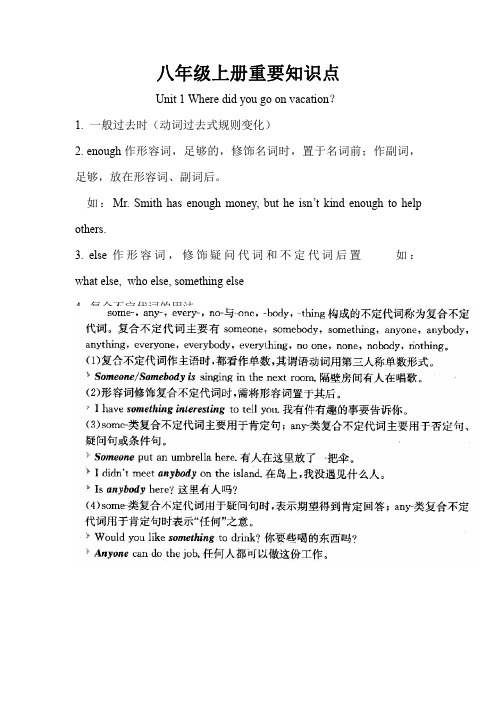
八年级上册重要知识点Unit1Where did you go on vacation?1.一般过去时(动词过去式规则变化)2.enough作形容词,足够的,修饰名词时,置于名词前;作副词,足够,放在形容词、副词后。
如:Mr.Smith has enough money,but he isn’t kind enough to help others.3.else作形容词,修饰疑问代词和不定代词后置如:what else,who else,something else4.复合不定代词的用法5.【延伸】one of+the most+adj+n复数,表示“最…之一”如:He is one of the most famous writers in China.a most+adj+n非常如:Hangzhou is a most beautiful city.6.反身代词①Did you buy anything for yourself?(做介词宾语)②The old man taught himself English.(做动词宾语)③The cow was itself again.又恢复了原状(做表语)④I myself visited my aunt last weekend.(做同位语)7.8.another two hours=two more hours9.感叹句①How+形容词+主语+谓语!②What a/an+形容词+可数名词单数+主语+谓语!What+形容词+复数名词/不可数名词+主语+谓语!10.so that引导目的状语从句,以便,为了(in order to)如:they got up early so that they could catch the bus.so+adj+that+结果状语从句,“如此……以致……”如:I was so busy that I didn’t go to sleep for3days.so+adj+(a/an+n单数)that如:It is so important a meeting that I can’t miss it.such+a/an+adj+n单数+that如:It is such an important meeting that I can’t miss it.such+adj+n复数/不可数+thatUnit2How often do you exercise?1.how如何(方式)how long多长(时间)答语常用“For+时间段”how far多远(距离)答语常用“It’s+数词+miles/meters/kilometers”how often多久一次(频率)答语常用“Always/often/every day/…”或“次数+时间”等表频率的状语how soon多快,多久以后,常用在将来时中。
人教版八年级上册英语知识点总结

人教版八年级上册英语知识点总结人教版八年级上册英语知识点1. It’s +形容词 + for sb. + to do sth. 做某事对某人来说是…的。
It’s important to do sth. 做某事很重要。
It’s important for me to eat a balanced diet. 平衡饮食对我来说是很重要的.It’s easy to do sth. 做某事是容易的。
It’s easy for us to find out the answer. 找出答案对我们来说是容易的。
2. 情态动词should的用法should是情态动词,它的基本用法是必须和其他动词一起构成谓语。
意为"应该......"。
should(应当,应该)用于所有人称,表示劝告或建议。
eg. ---I have a very bad cold. 我感冒很厉害。
---You should lie down and have a rest. 你应该躺下,多喝水。
3. maybe与may be(1)maybe是副词,译为“也许、可能”,相当于“perhaps”。
如:Maybe he can answer the question. 也许他能回答那个问题。
He maybe is from the USA, too. 他可能也来自美国。
(2)may be中的may为情态动词,译为“可能是......”。
如:He may be from the USA, too. 他可能也来自美国。
She may be our English teacher. 她可能是我们的英语老师。
4. few、a few、little、a little的区别和联系:(1)few / a few用来修饰可数名词,few表示否定意义,没有,几乎没有;a few表示肯定意义,有几个。
例如:He has few friends here, he feels lonely. 他这里没朋友,他感觉寂寞。
人教版八年级上册英语知识点总结

人教版八年级上册英语知识点总结一、语法重点1. 时态- 一般现在时:表示经常发生的动作或状态,以及普遍真理。
- 一般过去时:描述过去发生的动作或状态。
- 现在进行时:表示正在进行的动作。
- 过去进行时:描述过去某一时刻正在进行的动作。
2. 代词- 人称代词主格:I, you, he, she, it, we, they。
- 物主代词:my, your, his, her, its, our, their。
- 反身代词:myself, yourself, himself, herself, itself, ourselves, yourselves, themselves。
3. 介词- 表示时间的介词:at, on, in。
- 表示地点的介词:at, on, in。
- 其他常用介词:with, by, for, from, to, of。
4. 句型结构- 一般疑问句:使用助动词do/does构成。
- 特殊疑问句:使用疑问词who, what, where, when, why, how 等。
- 否定句:使用助动词do/does后跟not。
5. 词汇- 动词短语:take off, turn on/off, get up, go to bed等。
- 形容词和副词:big/large, small, quick/fast, slowly, carefully等。
- 常用名词:student, teacher, school, family, friend等。
二、词汇与短语1. 学校相关词汇- classroom, teacher, student, library, gym, cafeteria。
- subject, lesson, homework, project, test, exam。
2. 家庭与朋友- family, parent, brother, sister, friend, neighbor。
八年级上册新人教版英语知识点

八年级上册新人教版英语知识点
以下是八年级上册新人教版英语的一些知识点:
1. 时态:一般现在时、一般过去时、一般将来时等
2. 数词:基数词和序数词的用法
3. 名词:可数名词和不可数名词的用法、单数和复数形式的变化、名词所有格的用法等
4. 形容词:形容词的比较级和最高级的用法、形容词修饰名词的顺序等
5. 冠词:不定冠词(a/an)和定冠词(the)的用法
6. 代词:主格、宾格、物主代词等的用法
7. 介词:常用介词的用法、介词短语的用法等
8. 动词:动词的基本形式、第三人称单数形式的变化、动词的时态、动词的语态(主动语态和被动语态)等
9. 语态:被动语态的构成和用法
10. 状语从句:时间状语从句、地点状语从句、原因状语从句、条件状语从句等
11. 间接引语:直接引语和间接引语的转换、引述动词的变化等
12. 比较级和最高级:比较级和最高级的构成和用法
13. 祈使句:祈使句的肯定形式和否定形式等
14. 定语从句:定语从句的引导词、定语从句的结构等
15. 倒装句:完全倒装句和部分倒装句的构成和用法
16. 直接引语和间接引语。
这些只是一些基本的知识点,具体内容还需要参考教材来学习。
人教版八年级英语上册各单元知识点汇总

人教版八年级英语上册各单元知识点汇总UNIT 1 Where did you go on vacation?Section A(1a-3c)重点单词1.anyone pron.任何人2.anywhere adv.在任何地方3.wonderful adj.精彩的;绝妙的4.few adj.& pron.不多;很少5.most adj., adv.& pron.最多;大多数6.something pron.某事;某物7.nothing pron.没有什么;没有一件东西8.everyone pron.每人;人人;所有人9.myself pron.我自己;我本人10.yourself pron.(pl.yourselves)你自己;您自己11.seem v.好像;似乎;看来12.bored adj.厌倦的;烦闷的13.someone pron.某人14.diary n.日记;记事簿15.hen n.母鸡16.pig n.猪词形变换1. wonder—wonderful(形容词)2. I—myself(反身代词)3. you—yourself(你自己)—yourselves(你们自己)4. diary—diaries(复数)5. bore—bored(描述人的形容词)—boring(描述事物的形容词)6. center—central(形容词)7. something—nothing(反义词)—anything(多用于否定句及疑问句)重点短语1. go on vacation 去度假2. quite a few 相当多;不少3. most of the time 大部分时间4. stay at home 待在家里5. go to the beach 去海滩6. take photos 照相7. have a good time 玩得开心8. keep a diary 记日记9. something special 一些特别的事情10. in the countryside 在乡下11. study for tests 备考12. go to the mountains 去爬山13. go shopping 去购物14. buy sth. for sb. 为某人买某物15. taste good/great 尝起来很好16. visit sb. /sp. 拜访某人/参观某地17. go out 出去18. go to summer camp 去夏令营19. of course 当然重点句型1. Long time no see.好久不见。
人教版八年级上册英语知识点汇总
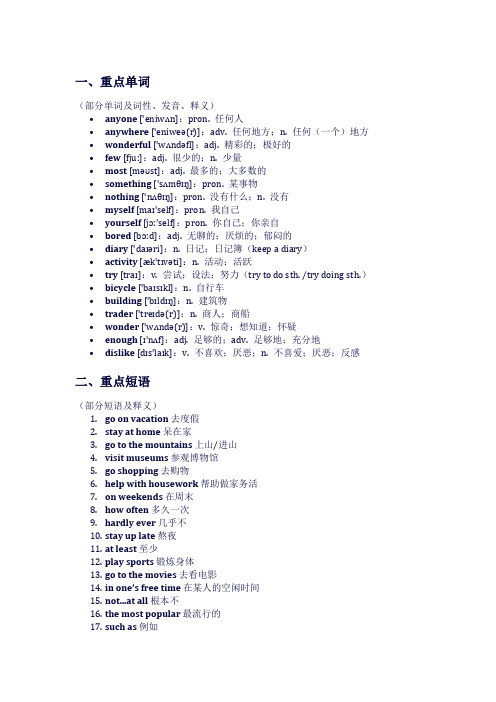
一、重点单词(部分单词及词性、发音、释义)•anyone ['eniwʌn]:pron. 任何人•anywhere ['eniweə(r)]:adv. 任何地方;n. 任何(一个)地方•wonderful ['wʌndəfl]:adj. 精彩的;极好的•few[fjuː]:adj. 很少的;n. 少量•most [məʊst]:adj. 最多的;大多数的•something ['sʌmθɪŋ]:pron. 某事物•nothing ['nʌθɪŋ]:pron. 没有什么;n. 没有•myself [maɪ'self]:pron. 我自己•yourself [jɔː'self]:pron. 你自己;你亲自•bored [bɔːd]:adj. 无聊的;厌烦的;郁闷的•diary ['daɪəri]:n. 日记;日记簿(keep a diary)•activity [æk'tɪvəti]:n. 活动;活跃•try [traɪ]:v. 尝试;设法;努力(try to do sth. /try doing sth.)•bicycle ['baɪsɪkl]:n. 自行车•building ['bɪldɪŋ]:n. 建筑物•trader ['treɪdə(r)]:n. 商人;商船•wonder ['wʌndə(r)]:v. 惊奇;想知道;怀疑•enough [ɪ'nʌf]:adj. 足够的;adv. 足够地;充分地•dislike [dɪs'laɪk]:v. 不喜欢;厌恶;n. 不喜爱;厌恶;反感二、重点短语(部分短语及释义)1.go on vacation去度假2.stay at home呆在家3.go to the mountains上山/进山4.visit museums参观博物馆5.go shopping去购物6.help with housework帮助做家务活7.on weekends在周末8.how often多久一次9.hardly ever几乎不10.stay up late熬夜11.at least至少12.play sports锻炼身体13.go to the movies去看电影14.in one’s free time在某人的空闲时间15.not...at all根本不16.the most popular最流行的17.such as例如18.play tennis打网球19.swing dance摇摆舞20.have a good time玩得愉快三、重点句型(部分句型及示例)1.Where did you go on vacation?o I went to New York City.2.Did you go out with anyone?o No, No one was here. Everyone was on vacation.3.Did you buy anything special?o Yes, I bought something for my father.4.How often do you exercise?o I go to the movies maybe once a month.5.Although many students like to watch sports, game shows are the mostpopular.o虽然很多学生喜欢看体育节目,但游戏节目依然是最受欢迎的。
初二英语知识点总结归纳上册人教版
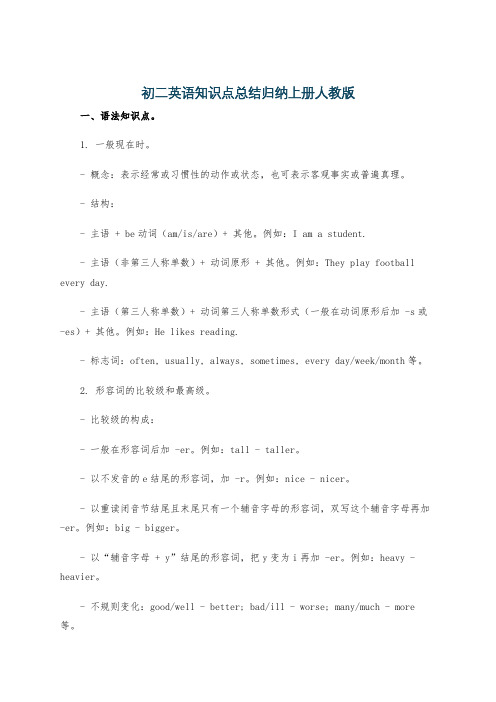
初二英语知识点总结归纳上册人教版一、语法知识点。
1. 一般现在时。
- 概念:表示经常或习惯性的动作或状态,也可表示客观事实或普遍真理。
- 结构:- 主语 + be动词(am/is/are)+ 其他。
例如:I am a student.- 主语(非第三人称单数)+ 动词原形 + 其他。
例如:They play football every day.- 主语(第三人称单数)+ 动词第三人称单数形式(一般在动词原形后加 -s或-es)+ 其他。
例如:He likes reading.- 标志词:often, usually, always, sometimes, every day/week/month等。
2. 形容词的比较级和最高级。
- 比较级的构成:- 一般在形容词后加 -er。
例如:tall - taller。
- 以不发音的e结尾的形容词,加 -r。
例如:nice - nicer。
- 以重读闭音节结尾且末尾只有一个辅音字母的形容词,双写这个辅音字母再加-er。
例如:big - bigger。
- 以“辅音字母 + y”结尾的形容词,把y变为i再加 -er。
例如:heavy - heavier。
- 不规则变化:good/well - better; bad/ill - worse; many/much - more 等。
- 比较级的用法:- 表示两者之间的比较,常用结构“比较级+than”。
例如:He is taller than me.- 最高级的构成:- 一般在形容词后加 -est。
例如:tall - tallest。
- 以不发音的e结尾的形容词,加 -st。
例如:nice - nicest。
- 以重读闭音节结尾且末尾只有一个辅音字母的形容词,双写这个辅音字母再加-est。
例如:big - biggest。
- 以“辅音字母 + y”结尾的形容词,把y变为i再加 -est。
例如:heavy - heaviest。
- 1、下载文档前请自行甄别文档内容的完整性,平台不提供额外的编辑、内容补充、找答案等附加服务。
- 2、"仅部分预览"的文档,不可在线预览部分如存在完整性等问题,可反馈申请退款(可完整预览的文档不适用该条件!)。
- 3、如文档侵犯您的权益,请联系客服反馈,我们会尽快为您处理(人工客服工作时间:9:00-18:30)。
新人教版|八年级上学期英语所有必考知识点大汇总Unit1 Where did you go on vacation?【重点语法】不定代词:不指名代替任何特定名词或形容词的代词叫做不定代词。
用法注意:1. some 和any +可数名/不可数名。
some 多用于肯定句,any多用于否定句、疑问句和条件从句。
有些问句中用some,不用any, 问话者希望得到对方肯定回答。
2. 由some, any, no, every 与body, one, thing构成的复合不定代词作主语时,其谓语动词用三单。
3. 不定代词若有定语修饰,该定语要置于其后:如:something interesting【重点短语】1. buy sth for ab./ buy sb. sth 为某人买某物2. taste + adj. 尝起来……3. nothing...but + V.(原形) 除了……之外什么都没有4. seem + (to be) + adj 看起来5. arrive in + 大地方/ arrive at + 小地方到达某地6. decide to do sth. 决定做某事7. try doing sth. 尝试做某事/ try to do sth. 尽力做某事8. enjoy doing sth. 喜欢做某事9. want to do sth. 想去做某事10. start doing sth. 开始做某事=begin doing sth.11. stop doing sth. 停止做某事区分:stop to do sth. 停下来去做某事12. dislike doing sth. 不喜欢做某事14. so + adj + that + 从句如此……以至于……16. tell sb. (not) to do sth. 告诉某人(不要)做某事17. keep doing sth. 继续做某事18. forget to do sth. 忘记去做某事/ forget doing sth 忘记做过某事【词语辨析】1. take a photo/ take photos 拍照quite a few+名词复数“许多…”2. seem + 形容词看起来…... You seem happy today.seem + to do sth. 似乎/好像做某事I seem to have a coldIt seems + 从句似乎..…. It seems that no one believe you.seem like ... 好像,似乎….. It seems like a good idea.3. arrive in +大地点= get to= reach+地点名“到达......”arrive at +小地点(注:若后跟地点副词here/there/home, 介词需省略,如:arrive here; get home)4. feel like sth 感觉像…feel doing sth. 想要做某事5. wonder(想知道)+疑问词(who, what, why)引导的从句。
6. because of +名/代/V-ingbecause+从句He can’t take a walk because of the rain.I don’t buy the shirt because it was too expensive.7. enough +名词足够的…...形容词/副词+enoughUnit2 How often do you exercise?【重点语法】1. 频率副词: always, usually, often, sometimes, never频率副词在句中通常放在实义动词之前, be动词或助动词之后。
常用于一般现在时态中。
2.“次数”的表达方法一次once,两次twice,三次或三次以上:基数词+ times, 如:three times, five times,3. how often“多久一次”问频率,回答常含有频率词组或短语。
常见的how疑问词:1)How soon 多久(以后)—How soon will he be back?他多久能回来?—He will be back in a month. 他一个月后能回来。
2)how long “多久”—How long did it take you to clean the house? 你打扫房子用了多久?—It took me half an hour to clean the house. 我打扫这房子用了半小时。
3)How many+名复How much+不可名“多少”问数量(how much 还可问价格)【重点短语】1. go to the movies 去看电影2. look after = take care of 照顾3. surf the internet 上网4. healthy lifestyle 健康的生活方式5. go skate boarding 去划板6. keep healthy=stay healthy 保持健康7. eating habits 饮食习惯8. take more exercise 做更多的运动9. the same as 与什么相同10. be different from 不同11. once a month一月一次12. twice a week一周两次13.make a difference to 对......有影响/作用14. most of the students=most students15. shop=go shopping=do some shopping 购物16. be good for 对......有益17. be bad for 对......有害18. come home from school放学回家19. of course = certainly = sure 当然20. get good grades 取得好成绩21. keep/be in good health 保持健康22. take a vacation 去度假【词语辨析】1. maybe / may bemaybe 是副词,意为“大概,可能,或许”,一般用于句首。
May be是情态动词,意为“可能是...,也许是...,大概是...”.The baby is crying. Maybe she is hungry.The woman may be a teacher.2. a few / few / a little / littlea few (少数的,几个,一些)a little (一点儿,少量)表示肯定few (很少的,几乎没有的)little (很少的,几乎没有的)表示否定修饰可数名词修饰不可数名词People can live to 100, but few people can live to 150.There is little time left. I won’t catch the first bus.Could you give me a little milk?3. hard / hardlyhard作形容词,意为“困难的,艰苦的,硬的”;作副词,意为“努力地,猛烈地”。
hardly为副词,意为“几乎不”。
The ground is too hard to dig.I can hardly understand them.It’s raining hard. The people can hardly go outside.4. As for homework , most students do homework every day .as for...意思是“至于;关于”,+名词、代词或动词的-ing形式(即动名词)。
如:As for him,I never want to see him here.至于他,我永远不希望在这里见到。
As for the story,you'd better not believe it.关于那故事,你最好不要相信。
5. That sounds interesting.这是“主语+系动词+表语”结构的简单句。
sound(听起来),look(看起来),smell(闻起来),taste (尝起来),feel(觉得),seem(好象),grow(变得),get(变得)等词在英语中可用作系动词,后跟形容词作表语。
如:It tastes good. 这味道好。
The music sounds very sweet. 这音乐听起来很入耳。
The smoke grew heavier and heavier. 烟雾变得越来越浓了。
6. percent 名词,意为“百分之……”百分数的表示方法:基数+ percent (不用复数形式),percent做主语时,谓语动词的数要根据其后面的名词来确定。
50%:fifty percent百分之五十Fifty percent of the apples are bad. 50%的苹果都坏了。
Twenty percent of the meat is in the fridge. 20%的肉都在冰箱7. not…at all 意为“一点也不”,not应放在be动词、情态动词或助动词之后。
The story isn’t interesting at all. 那个故事一点也没有趣。
8. It is + adj. to do sth. 做某事是……的。
It is interesting to play computer games. 玩电脑很有趣。
9. take, spend, payIt takes sb. some time to do sth. 意为“花费某人……时间来做某事”。
人(sb.) spend 时间/钱on sth. “买某物花了……钱”。
人(sb.) spend 时间/钱(in) doing“花费多少时间来做某事”。
pay 的主语必须是人,而“花钱买某物”为pay...for...10. however 副词,意为“然而,可是”,表示转折关系,可放在句首、句中、句末。
Unit3 I’m more outgoing than my sister.重点语法】1. 形容词和副词的比较等级(1)形容词和副词的原形就是原级(2)比较级,表示较……或更……(3)最高级,表示最...。
2. 比较级句型:(1)A + be动词+形容词的比较级+than +B “A比B更……”(注意:A与B必须是同级的,即必须是人与人,物与物进行对比)(2)“A+实意动词+副词比较级+ than + B”表示“A比B…”(3)比较A ,B两人/两事物问其中哪一个较…...时用句型:“Who/which +谓语动词+ adj./adv.比较级,A or B ?”Who is thinner, Jenny or Mary?3. 比较级的特殊用法(1)“比较级+and+比较级”,意为“越来越”。
